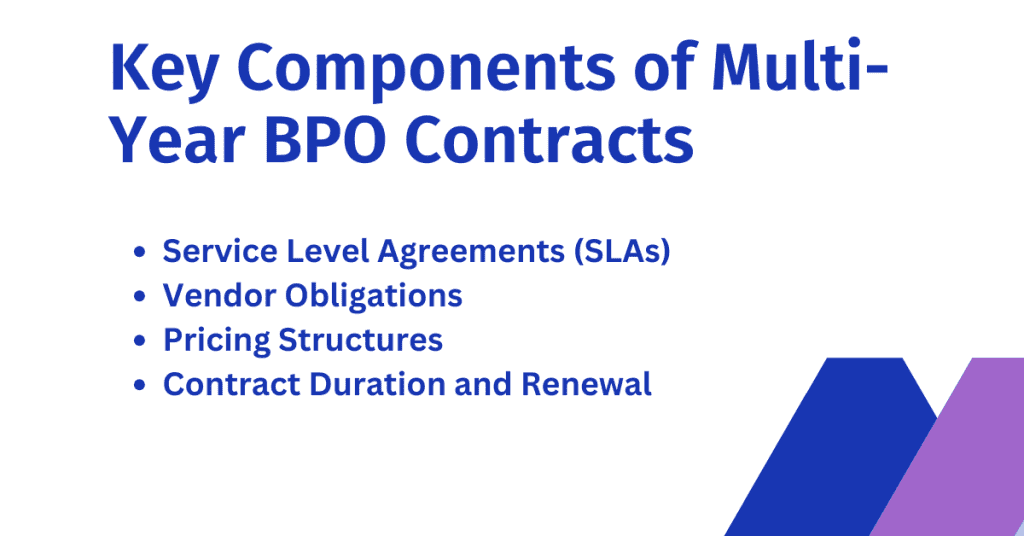Business Process Outsourcing (BPO) is the delegation of specific business processes to a third-party service provider. This strategic approach allows companies to focus on their core competencies while leveraging the expertise and efficiency of specialised external partners. BPO encompasses a wide range of functions, including customer service, human resources, accounting, IT services, and more.
Multi-year BPO contracts offer stability and potential cost savings due to long-term commitments. However, they may limit flexibility and hinder adaptation to evolving business needs, technology advancements, or market changes.
In modern business strategies, BPO plays a crucial role in enhancing operational efficiency, reducing costs, and enabling scalability. By outsourcing non-core activities to experienced providers, businesses can streamline their operations, access global talent pools, and stay competitive in dynamic market environments. Moreover, BPO enables organisations to adapt quickly to market changes, mitigate risks, and maintain flexibility in resource allocation.
Multi-year BPO contracts represent long-term partnerships between businesses and BPO service providers. These agreements extend beyond the typical one-year duration, offering stability, predictability, and deeper collaboration between the parties involved. In today’s business landscape, where continuity and reliability are paramount, multi-year BPO contracts provide a strategic advantage by fostering trust, alignment of objectives, and sustained value creation.
This article explores the intricacies of multi-year BPO contracts, focusing on key aspects such as contract negotiation, outsourcing agreements, service level agreements (SLAs), and vendor selection. It delves into the benefits, risks, and best practices associated with long-term BPO partnerships, offering insights to help businesses optimise their outsourcing strategies and maximise returns on investment.
Understanding Multi-Year BPO Contracts
Multi-year BPO contracts are long-term agreements between businesses and outsourcing service providers, typically extending beyond the traditional one-year duration. These contracts encompass a wide range of business process outsourcing (BPO) activities, including customer service, IT support, HR functions, and more. The scope of multi-year BPO contracts is extensive, covering various aspects of operations that are outsourced to specialised vendors.
Long-Term Commitments in BPO Partnerships
Long-term commitments in BPO partnerships offer numerous benefits for both parties involved. They provide stability, predictability, and continuity in operations, fostering stronger relationships and deeper collaboration over time. By entering into multi-year contracts, businesses can establish trust, align objectives, and drive mutual growth and success. Moreover, long-term commitments enable service providers to invest in infrastructure, technology, and talent development, resulting in enhanced service delivery and value creation for clients.

Key Components of Multi-Year BPO Contracts
- Service Level Agreements (SLAs): SLAs define the performance standards, metrics, and quality benchmarks that govern the delivery of BPO services. They outline the expectations of both parties regarding service levels, response times, and resolution processes, ensuring transparency and accountability throughout the contract duration.
- Vendor Obligations: Multi-year BPO contracts delineate the responsibilities and obligations of the outsourcing service provider. These obligations may include the provision of skilled personnel, adherence to regulatory requirements, data security measures, and compliance with industry standards. Clear delineation of vendor obligations helps mitigate risks and ensures consistent service delivery.
- Pricing Structures: Pricing structures in multi-year BPO contracts vary depending on the nature and scope of services outsourced. Common pricing models include fixed pricing, time and materials (T&M), and outcome-based pricing. It is essential for businesses to evaluate pricing structures carefully to ensure cost-effectiveness and alignment with budgetary constraints.
- Contract Duration and Renewal: Multi-year BPO contracts specify the duration of the agreement and the conditions for renewal or termination. These provisions provide clarity and certainty for both parties, facilitating long-term planning and decision-making. Contract renewal terms may include renegotiation of terms, pricing adjustments, and performance evaluations.
Advantages of Multi-Year BPO Contracts
Multi-year BPO contracts offer significant cost savings and efficiency gains through long-term commitments. By committing to extended outsourcing partnerships, businesses can negotiate more favorable pricing structures and volume discounts with service providers. This results in reduced operational costs and improved cost predictability over the contract duration. Moreover, long-term commitments enable service providers to invest in process improvements, automation, and technology upgrades, leading to enhanced operational efficiency and productivity gains for both parties involved.
Enhanced Vendor-Client Relationship and Collaboration
Long-term BPO contracts foster enhanced vendor-client relationships and collaboration. By entering into multi-year agreements, businesses and service providers can develop deeper understanding, trust, and alignment of objectives over time. This collaborative approach facilitates seamless communication, knowledge sharing, and continuous improvement initiatives, leading to better outcomes and value creation for both parties. Strong relationships built on mutual respect and transparency form the foundation for successful long-term partnerships in the BPO industry.
Predictable Budgeting and Financial Planning
Multi-year BPO contracts provide predictable budgeting and financial planning for both parties involved. By locking in pricing and terms for an extended period, businesses can accurately forecast and allocate resources, mitigating financial uncertainties and fluctuations. This enables better strategic decision-making and resource allocation, allowing organisations to focus on core business priorities and growth initiatives. Additionally, predictable budgeting fosters financial stability and confidence, enhancing overall business resilience and sustainability.
Leveraging Economies of Scale
Multi-year BPO contracts allow businesses to leverage economies of scale for improved service quality. By consolidating and standardising outsourcing activities over an extended period, companies can achieve economies of scale in resource utilisation, process optimisation, and technology investments. This enables service providers to deliver higher quality services at competitive prices, while also driving innovation and value-added services to meet evolving business needs. Leveraging economies of scale enables businesses to stay agile, competitive, and responsive in dynamic market environments.
How to Negotiate Multi-Year BPO Contracts
Negotiating multi-year BPO contracts requires careful research, strategic planning, and effective communication. By following key steps and best practices, businesses can maximise the value of their outsourcing partnerships and achieve mutually beneficial outcomes.
Research and Preparation
Before entering into negotiations, it is essential to conduct thorough research and understand your organisation’s needs, objectives, and market benchmarks. Identify the specific BPO services required, performance metrics, and industry standards to establish a baseline for negotiations. Additionally, research potential vendors, their capabilities, track record, and market reputation to inform vendor selection and negotiation strategies.
Setting Clear Objectives and Priorities
Define clear objectives and priorities for the negotiation process, aligning them with your organisation’s strategic goals and operational requirements. Prioritise key terms and conditions, such as service levels, pricing structures, contract duration, and flexibility clauses, based on their impact on business outcomes and risk mitigation. Establishing clear objectives ensures focus and clarity during negotiations, enabling more effective decision-making and outcome alignment.
Establishing Mutually Beneficial Terms and Conditions
Negotiate terms and conditions that are mutually beneficial for both parties involved in the multi-year BPO contract. Seek to create win-win scenarios by understanding the needs and objectives of the vendor while safeguarding your organisation’s interests and priorities. Collaboratively explore options for value-added services, performance incentives, and innovation opportunities to enhance the overall value proposition of the partnership.
Leveraging Competition and Alternative Options
Leverage competition and alternative options to negotiate more favorable terms and conditions in multi-year BPO contracts. Engage with multiple vendors, solicit competitive bids, and compare proposals to identify opportunities for cost savings, service enhancements, and risk mitigation. Demonstrating a willingness to explore alternative options signals to vendors that your organisation is committed to securing the best possible terms, encouraging them to offer competitive pricing and value-added services.
Minimising Risks in Long-Term BPO Contracts
Minimising risks in long-term BPO contracts requires proactive identification, assessment, and mitigation strategies to safeguard the interests of both parties involved. By implementing effective risk management practices, businesses can mitigate potential challenges and ensure the success of their outsourcing partnerships.
Identifying and Assessing Potential Risks
Before entering into multi-year BPO contracts, it is essential to identify and assess potential risks associated with outsourcing arrangements. Common risks include service disruptions, quality issues, data security breaches, regulatory compliance failures, and vendor instability. Conduct a comprehensive risk assessment, considering factors such as the nature of outsourced activities, vendor capabilities, industry regulations, and market dynamics. By understanding the risks upfront, businesses can develop proactive strategies to mitigate them effectively.
Mitigation Strategies
Implement robust mitigation strategies to address potential risks in long-term BPO contracts. Key mitigation measures include:
- Redundancy Planning: Establish redundant systems, processes, and resources to minimise the impact of service disruptions or vendor failures. Maintain alternative options for critical services to ensure business continuity and minimise downtime.
- Contingency Clauses: Include contingency clauses in BPO contracts that outline procedures and responsibilities in the event of unforeseen circumstances or breaches of contract. Specify escalation procedures, dispute resolution mechanisms, and termination rights to protect the interests of both parties.
- Exit Strategies: Develop clear exit strategies that enable a smooth transition in the event of contract termination or vendor changes. Define exit criteria, transition timelines, and data migration processes to mitigate risks and ensure a seamless transition to alternative service providers.
- Performance Reviews: Conduct regular performance reviews and risk assessments throughout the duration of the multi-year BPO contract. Monitor key performance indicators (KPIs), service levels, and vendor performance against agreed-upon benchmarks. Identify emerging risks, issues, or areas for improvement and take corrective actions proactively to address them.
Regular Performance Reviews and Risk Assessments
Regular performance reviews and risk assessments are critical to addressing evolving challenges and mitigating risks in long-term BPO contracts. Schedule periodic reviews to evaluate vendor performance, service quality, and compliance with contractual obligations. Engage in open and transparent communication with the vendor to discuss any issues, concerns, or opportunities for improvement. By maintaining ongoing oversight and accountability, businesses can identify potential risks early and take proactive measures to mitigate them effectively.
Ensuring Compliance in Multi-Year BPO Agreements
Compliance is paramount in multi-year BPO contracts to mitigate legal, regulatory, and operational risks, ensuring smooth operations and maintaining trust between parties. Establishing robust monitoring, reporting mechanisms, clear communication channels, and regular audits are essential to uphold contractual obligations effectively.
Compliance in BPO Contracts
Compliance in multi-year BPO contracts is crucial for several reasons:
- Legal Obligations: Adhering to legal requirements and regulations ensures that both parties operate within the bounds of the law, avoiding potential legal disputes and liabilities.
- Regulatory Compliance: Compliance with industry regulations and standards safeguards data privacy, security, and confidentiality, mitigating risks associated with regulatory non-compliance.
- Operational Efficiency: Ensuring compliance enhances operational efficiency by minimising disruptions, errors, and delays in service delivery, thereby maintaining customer satisfaction and trust.
Robust Monitoring and Reporting Mechanisms
To ensure compliance in multi-year BPO contracts, establish robust monitoring and reporting mechanisms:
- Performance Metrics: Define key performance indicators (KPIs) and benchmarks to track vendor performance against contractual obligations regularly.
- Monitoring Tools: Implement monitoring tools and systems to collect, analyse, and report on performance data, enabling proactive identification of compliance issues.
Clear Communication Channels and Escalation Procedures
Clear communication channels and escalation procedures are essential for addressing compliance issues effectively:
- Stakeholder Communication: Maintain open and transparent communication channels between stakeholders to facilitate the exchange of information and address concerns promptly.
- Escalation Protocols: Establish clear escalation protocols to escalate compliance issues to the appropriate levels of management for resolution in a timely manner.
Regular Audits and Reviews
Conducting regular audits and reviews is critical to ensuring ongoing compliance in multi-year BPO contracts:
- Compliance Audits: Conduct periodic compliance audits to assess adherence to contractual obligations, identify areas for improvement, and implement corrective actions.
- Performance Reviews: Review vendor performance and compliance during scheduled performance reviews, providing feedback and guidance for continuous improvement.
Conclusion
The advantages of multi-year BPO contracts include cost savings, efficiency gains, enhanced vendor-client relationships, predictable budgeting, and leveraging economies of scale. However, businesses must also consider potential risks such as service disruptions, quality issues, regulatory non-compliance, and vendor instability.
Strategic planning, negotiation, and ongoing management are essential in maximising the value of long-term BPO partnerships. Businesses should invest time and resources in defining clear objectives, prioritising key terms, and establishing robust monitoring mechanisms to ensure compliance and performance optimisation throughout the contract duration.
We encourage businesses to leverage multi-year BPO contracts as a means of locking in value and driving sustainable growth. By adopting a proactive approach to contract management, businesses can capitalise on opportunities for innovation, efficiency improvements, and cost savings, ultimately enhancing their competitive advantage in the marketplace.
FAQs
What are the advantages of signing multi-year BPO contracts?
Multi-year BPO contracts offer cost savings, long-term stability, enhanced vendor-client relationships, and streamlined operations. They provide predictability in budgeting, promote strategic alignment, and enable better resource planning for both parties involved.
How can I negotiate favorable terms in a long-term BPO agreement?
Negotiate favorable terms in a long-term BPO agreement by conducting thorough research, setting clear objectives, prioritising key terms, leveraging competition, and seeking win-win solutions. Focus on establishing mutually beneficial conditions that align with your strategic goals and operational requirements.
What are the risks associated with multi-year BPO contracts?
Risks associated with multi-year BPO contracts include service disruptions, quality issues, data security breaches, regulatory non-compliance, and vendor instability. Lack of flexibility, changing business needs, and economic uncertainties can also pose challenges.
How do I manage a multi-year BPO contract effectively?
Manage a multi-year BPO contract effectively by establishing robust monitoring mechanisms, clear communication channels, and regular performance reviews. Define key performance indicators (KPIs), conduct compliance audits, and address issues promptly through escalation procedures.
What clauses should I include in a multi-year BPO agreement?
Include clauses in a multi-year BPO agreement related to service levels, pricing structures, termination rights, dispute resolution, confidentiality, data security, and compliance. Define responsibilities, obligations, and performance metrics for both parties involved.
How do I select the right vendor for a long-term BPO partnership?
Select the right vendor for a long-term BPO partnership by evaluating capabilities, track record, industry reputation, financial stability, cultural fit, and scalability. Conduct due diligence, request proposals, and assess vendor responses based on your specific requirements and objectives.
How can I ensure compliance in a multi-year BPO contract?
Ensure compliance in a multi-year BPO contract by establishing robust monitoring mechanisms, clear communication channels, and regular audits. Define compliance requirements, conduct training, and enforce contractual obligations through proactive management and oversight.
What metrics should I use to evaluate performance in long-term BPO deals?
Use metrics such as service level adherence, quality scores, customer satisfaction ratings, efficiency gains, cost savings, and innovation contributions to evaluate performance in long-term BPO deals. Customise metrics based on your strategic goals and operational priorities.
How do I optimise profitability in multi-year BPO contracts?
Optimise profitability in multi-year BPO contracts by negotiating competitive pricing, incentivising performance improvements, optimising resource utilisation, and driving efficiency gains. Focus on cost reduction, revenue enhancement, and value-added services to maximise returns on investment.
What are the best practices for terminating a multi-year BPO agreement?
The best practices for terminating a multi-year BPO agreement include defining clear termination clauses, establishing transition plans, ensuring data migration, and resolving outstanding issues. Communicate openly, follow contractual procedures, and seek legal advice if necessary to minimise risks and ensure a smooth transition.





